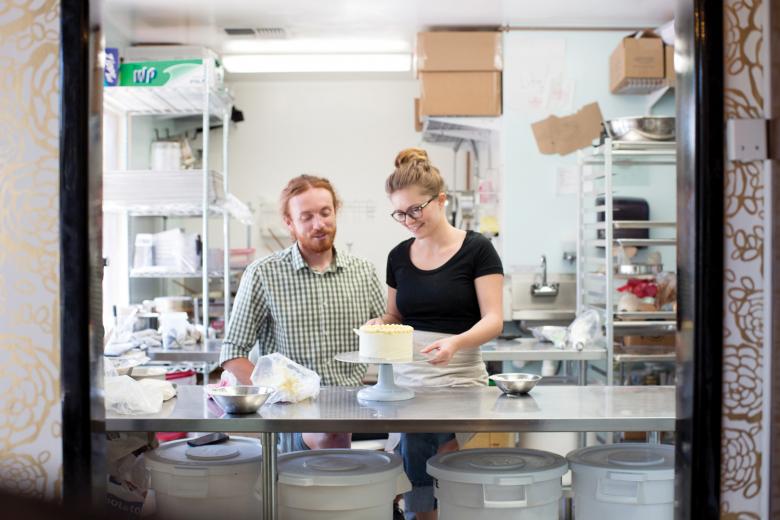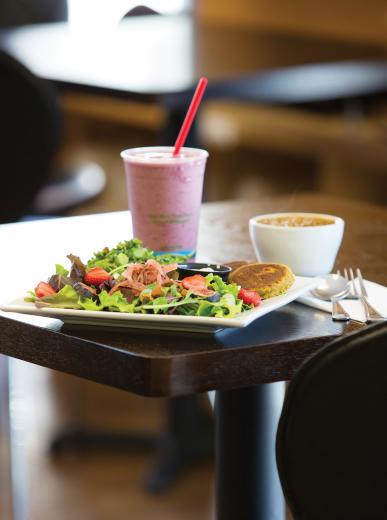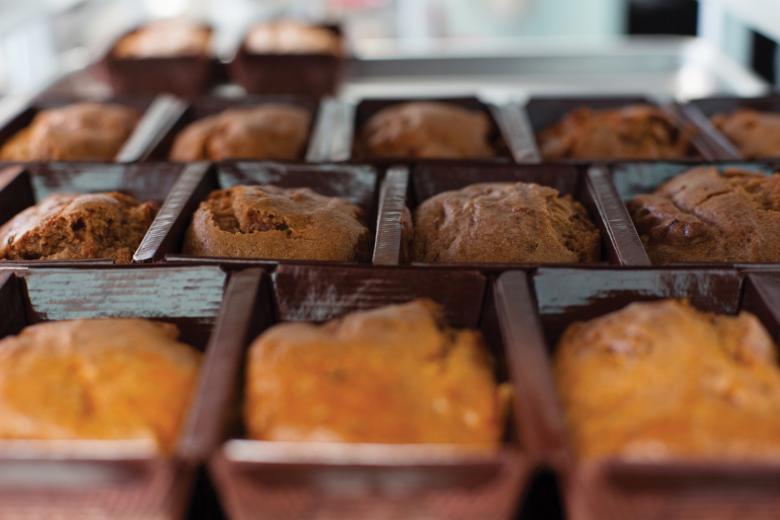Demand for gluten-free foods is increasing as more American’s are gaining awareness about the health impacts of wheat. Health seekers and people sensitive to wheat’s protein composite are often limited by the menu options at standard restaurants. But that is changing as local eateries capitalize on the surge of consumers with dietary restrictions.
For some restaurateurs, the gluten-free phenomenon means cash in the door. For others, it’s more than just a business strategy.
Angelique Miller, co-owner of Baagan, a gluten-free, vegan café in Roseville, has experienced the gratitude of diners first hand. Customers with wheat allergies or celiac disease, the autoimmune disorder caused by gluten protein, have found the small café to be one of the few restaurant alternatives. “Somebody walks up to me everyday and says, ‘Thank you for being here,’” Miller says.
Gluten sensitivity affects approximately 18 million people, or six percent of the population, according to research from the Center for Celiac Research & Treatment. Symptoms range from fatigue and foggy mind to diarrhea, depression and joint pain. And, although celiac disease affects just one percent of the U.S. population, gluten aversion is fast becoming mainstream.
Which is why locations like Baagan (the Hindi word for garden) are profiting by bridging the gap between the standard American diet (SAD) and the health world, Miller says.
“We just want to be an option. And that’s been the greatest thing,” she says. “People come in and say, ‘God, it’s so nice to be able to go out and eat again and to have somewhere I can go.’”
Two years ago, Miller was introduced to her soon-to-be business partner, Rajbir Randhawa. The two had mutual passions for health and vegan food, and Randhawa had already begun using her family’s wisdom in herbs and Ayurveda, an Indian medicine system, to sell teas to businesses like Whole Foods. Miller had studied the raw food movement, and the two joined to deliver healthy products and nontraditional options to a growing population of ingerdient-conscious customers.
For Randhawa, much of the motivation to open an eatery stemmed from her inability to see the effects her tea had on customers. She would sell her products to retailers, and that was the end of the line.
“You couldn’t really see how you were impacting your customers. If something goes on the shelf, you never really see who buys it,” Miller says.
Now Randhawa and Miller experience the gratitude of customers who have found the café to be a safe resort.
“This one gentleman told me last week that his wife has celiac and it’s very severe,” Miller says. “He said, ‘I can’t go anywhere else to eat’… So that’s the biggest impact that I want to make, just to have some option for people and then let them choose. Just be here and be available.”
But Baagan isn’t the only restaurant answering the call from gluten-free foodies. Orphan Breakfast House in East Sacramento also has a gluten-free menu on hand, if ever asked for one. Owned by Chris Pendarvis, the East Sacramento diner is an addition to Pendarvis’ three coffee houses in Sacramento, including Naked Lounge, Naked Coffee and Tupelo. A popular eatery in a health-seeking neighborhood, Orphan created a gluten-free menu six months ago at the request of its customers.
“People (were) constantly asking, ‘Are the tamales gluten free?’ ‘Are the tortillas gluten free?’ ‘Do you have pancakes that are gluten free?’ So, with people constantly asking, we started to create something that was more accessible to them,” says General Manager Inga Skogberg.
The standard menu, created by original Orphan chef Isabel Cruz, is set, Skogberg says. Still, the cooks create specials, and the staff of 25 yields to the dietary restrictions of customers.
Less than two miles away, a constant trickle of sweet-toothed customers enters the doors of a small, midtown bakery. One of a kind in Sacramento, Pushkin’s Bakery is all natural and offers only gluten-free and dairy-free goods.
“We’re the only dedicated gluten- and dairy-free bakery in almost all of California,” says owner Danny Turner. “People come from Reno, people come from down south, people are coming from all over the place. So the niche market kind of works for us.”
Danny and his wife, Olga, decided to open a gluten and dairy-free
bakery after Danny was diagnosed with gluten and dairy
intolerance six years ago. Olga, who is an avid baker, says she
began tweaking gluten- and dairy-free recipes until she found one
her husband liked — a gluten- and dairy-free chocolate chip
cookie. Now, the only baked goods that are made in the bakery are
ones Danny is able to eat.
“There’s not a single thing that we make here that I can’t eat,”
he says. “That’s kind of how it was modeled. But it works out
really good business-wise because there’s a lot of people who are
like me.”
According to Packaged Facts, a food and beverage research provider, the market for gluten-free items shot up 28 percent between 2008 and 2012, reaching $4.2 billion last year. And sales tracking firm NPD Group reports that about a third of U.S. adults say they want to reduce or eliminate gluten in their diet.
Because there is little competition to drive down the cost of gluten-free products, they’re often more expensive than the standard fare. Still, the average gluten-free consumer is already spending more on ingredients for baking at home than their wheat-consuming neighbors.
“With gluten-free baking, you have to use a combination of at least three or four different flours,” Danny Turner says. “It’s really expensive. So it’s like, ‘I’m going to spend a lot at home anyway, maybe I’m OK spending a little bit more at a bakery.’”
Located near the recently relocated Sacramento Natural Foods Co-op, Pushkin’s has also benefitted from local, whole-food shoppers already in the neighborhood.
“When we don‘t have things to cover up our products, you know, like artificial coloring and artificial fruit flavoring, we have to have good ingredients to start out with,” Turner says. “I think people appreciate that. And that’s probably why they’re OK paying more.”
Turner estimates that about 75 percent of people who come into the bakery do not have celiac disease but are self-diagnosed as gluten sensitive. And plenty of wheat lovers still drop in for treats, too.
“We want it to taste like quote-unquote, normal food,” he says.
Noting the potential for growth in Sacramento’s gluten- and dairy-free market, Turner says he and his wife would like to expand to the surrounding areas before branching outside of the region. But he doesn’t plan on handing over the reigns any time soon.
“I’d hate to lose some of that control with franchising,” Turner says. “I’m sure that we’d have restrictions and we’d have our guidelines. But at the same time, I’d lose a lot of control and there’s a real personal element here.”
Plus, the couple opened the business because it’s meeting a need that is very personal to them.
“On a daily basis, someone gives us a hug,” Turner says. “I think, as bakers, we have a unique experience. I don’t think anyone comes in and is as happy as our customers are. They’ve been waiting for years and years to come to a place like this.”
Recommended For You

Juiced
Bowel Formula No. 2, friend or foe?
It’s a seductive pitch: Cleanse your body. Feel healthy. Lose weight.
You only have to do one thing: starve.

Sleep It Off
Why taking a nap would be more valuable than reading this article
I have an especially stupid case of insomnia, but we as a society are rotten sleepers and I’m not alone. Since doctors recommend seven to eight hours a night, about half the population is sleep deprived. We’re a nation of walking zombies.





